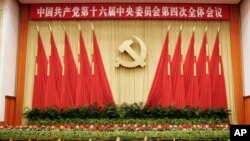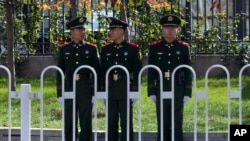The Third Plenary Session of the 18th CPC Central Committee, commonly referred to as the Third Plenum, is the third party meeting since Xi Jinping was named Communist Party secretary last November. Third plenums are seen as important political gatherings where the new leadership can map out new policy directions, and set the pace for future reforms.
History
In 1978, two years after Mao Zedong's death, Deng Xiaoping announced the "opening up and reform" strategy that introduced principles of capitalistic economy into the Chinese system and allowed foreign investment to enter the Chinese market. In 1993, then premier Zhu Rongji endorsed the concept of "socialist market economy." The meeting created momentum for deeper liberalization of sectors that had previously been firmly in the hands of the state.
Economic reforms
Chinese leaders are working on a combination of reform proposals that will help push China into the next phase of its economic growth: one less reliant on heavy industry, government investment and infrastructure projects. President Xi Jinping has talked about the need to realize China's rejuvenation, and China's dream. Analysts believe that together with financial and economic measures to rein in the power of vested interests within the state-owned sector, Chinese leaders will need to tackle issues of social justice and income inequality.
Banking sector
The Chinese banking system is monopolized by large state-owned institutions that favor funding state-owned enterprises instead of smaller private businesses. Interest rates are kept low, which limits Chinese savers' options for investment and consumption. To spur more spending from consumers, Chinese leaders have talked about diversifying the banking sector and relaxing restrictions on deposit interest rates.
Fiscal and tax system
The current taxation system in China was reorganized in the 1990s by then premier Zhu Rongji to redistribute tax revenues in favor of the central government. At the time, the move was seen as an attempt to avoid local corruption, but analysts agree that the system has now run its course. Local governments are strapped for cash. In recent years they have resorted to land sales and massive amounts of credit for their operational revenues. Tax reform will attempt to redistribute fiscal revenues to local governments.
Land
Land collectivization in the 1950s took farmers' property rights to the land and transferred them to communes, managed by local party officials. Such a set-up largely still exists in the Chinese countryside, and allows local governments to arbitrarily sell farmers' land. Land reform would grant farmers more protection by allowing them to sell rural land and properties at market value.
Welfare
Welfare reform includes the creation of a pension system, and the extension of health care and education benefits to rural areas and migrant workers. Improvement of the current welfare system is one of the most immediate demands of China's citizens. Analysts agree that by strengthening China's welfare safety net, the government would also be encouraging Chinese to consume more instead of saving.
Hukou
Internal migration in China has often been dubbed the largest migration in history. Hundreds of millions decide to leave the countryside to look for jobs in cities every year. But once they leave their hometowns, migrants lose their rights to welfare coverage and are subjected to discriminatory policies, including restrictions on jobs, housing and education. Analysts say that an overhaul of the household registration system - or hukou - which links citizens to their place of origin, is a key step to adjust social inequality.
Economic statistics
National GDP growth in 2012: 7.8%
Per Capita GDP: $6,091 US, ranked 90th in the world (World Bank)
Unemployment: 4%
Social Unrest: Tsinghua Professor Sun Liping estimated 180,000 mass incidents in 2010
History
In 1978, two years after Mao Zedong's death, Deng Xiaoping announced the "opening up and reform" strategy that introduced principles of capitalistic economy into the Chinese system and allowed foreign investment to enter the Chinese market. In 1993, then premier Zhu Rongji endorsed the concept of "socialist market economy." The meeting created momentum for deeper liberalization of sectors that had previously been firmly in the hands of the state.
Economic reforms
Chinese leaders are working on a combination of reform proposals that will help push China into the next phase of its economic growth: one less reliant on heavy industry, government investment and infrastructure projects. President Xi Jinping has talked about the need to realize China's rejuvenation, and China's dream. Analysts believe that together with financial and economic measures to rein in the power of vested interests within the state-owned sector, Chinese leaders will need to tackle issues of social justice and income inequality.
Banking sector
The Chinese banking system is monopolized by large state-owned institutions that favor funding state-owned enterprises instead of smaller private businesses. Interest rates are kept low, which limits Chinese savers' options for investment and consumption. To spur more spending from consumers, Chinese leaders have talked about diversifying the banking sector and relaxing restrictions on deposit interest rates.
Fiscal and tax system
The current taxation system in China was reorganized in the 1990s by then premier Zhu Rongji to redistribute tax revenues in favor of the central government. At the time, the move was seen as an attempt to avoid local corruption, but analysts agree that the system has now run its course. Local governments are strapped for cash. In recent years they have resorted to land sales and massive amounts of credit for their operational revenues. Tax reform will attempt to redistribute fiscal revenues to local governments.
Land
Land collectivization in the 1950s took farmers' property rights to the land and transferred them to communes, managed by local party officials. Such a set-up largely still exists in the Chinese countryside, and allows local governments to arbitrarily sell farmers' land. Land reform would grant farmers more protection by allowing them to sell rural land and properties at market value.
Welfare
Welfare reform includes the creation of a pension system, and the extension of health care and education benefits to rural areas and migrant workers. Improvement of the current welfare system is one of the most immediate demands of China's citizens. Analysts agree that by strengthening China's welfare safety net, the government would also be encouraging Chinese to consume more instead of saving.
Hukou
Internal migration in China has often been dubbed the largest migration in history. Hundreds of millions decide to leave the countryside to look for jobs in cities every year. But once they leave their hometowns, migrants lose their rights to welfare coverage and are subjected to discriminatory policies, including restrictions on jobs, housing and education. Analysts say that an overhaul of the household registration system - or hukou - which links citizens to their place of origin, is a key step to adjust social inequality.
Economic statistics
National GDP growth in 2012: 7.8%
Per Capita GDP: $6,091 US, ranked 90th in the world (World Bank)
Unemployment: 4%
Social Unrest: Tsinghua Professor Sun Liping estimated 180,000 mass incidents in 2010





